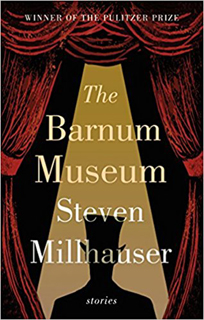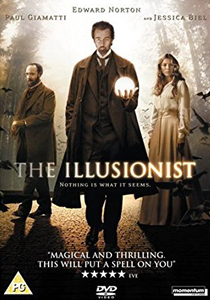
('Crystal Ball 4' © Scott Stults,2017)
EISENHEIM THE ILLUSIONIST: SYMBOLIC THREATS AND LITERAL PERILS
by CHRIS MACHELL
Neil Burger’s 2006 adaptation of ‘Eisenheim The Illusionist’, a short story by Steven Millhauser, is exemplary of the pitfalls of literalising the symbolic. Burger’s The Illusionist is by no means a bad film, but it’s rote plot and diluted imagery is interesting as an illustration of the Hollywood machine’s misconception that audiences only ever accept the familiar and unchallenging.
Millhauser’s short story tells of the career of Eisenheim, a magician working in Vienna in the 1890s. Lacking a plot in the conventional sense, it is presented as a fictional history of Eisenheim, describing his early days as a skilled imitator of well-known parlour tricks, his mid-career developing new illusions, and his final phase as a conjurer whose performances begin to blur the lines between reality and artifice. Told in the third person, the reader is never granted direct access to Eisenheim. We know nothing of his past save for a legend about his meeting a conjurer as a young boy, his speech is never direct and the nature of his illusions are never revealed. Almost as if we are a member of his audience, we are never quite able to peer behind the curtain to see what is really happening.
 In contrast, Burger’s version of Eisenheim, played in the film by a typically-cast Edward Norton, is imbued with an off-the-shelf back story blatantly devised to make him more sympathetic to the audience. Growing up as a poor cabinet-maker’s son, he falls in love with Sophie, the daughter of the local aristocrat. Told via flashback through Paul Giamatti’s Police Inspector Uhl, we learn that Eisenheim and Sophie conduct a secret love affair until she is taken away, ultimately to become the fiancée of the fictional Crown Prince Leopold. Years later, through an incredible coincidence, Sophie (now played by Jessica Biel) finds herself as an audience volunteer in one of Eisenheim’s performances, as Leopold watches on. Their love affair is reignited and it doesn’t take a master of screenwriting to see where the plot is headed.
In contrast, Burger’s version of Eisenheim, played in the film by a typically-cast Edward Norton, is imbued with an off-the-shelf back story blatantly devised to make him more sympathetic to the audience. Growing up as a poor cabinet-maker’s son, he falls in love with Sophie, the daughter of the local aristocrat. Told via flashback through Paul Giamatti’s Police Inspector Uhl, we learn that Eisenheim and Sophie conduct a secret love affair until she is taken away, ultimately to become the fiancée of the fictional Crown Prince Leopold. Years later, through an incredible coincidence, Sophie (now played by Jessica Biel) finds herself as an audience volunteer in one of Eisenheim’s performances, as Leopold watches on. Their love affair is reignited and it doesn’t take a master of screenwriting to see where the plot is headed.
Not only is The Illusionist’s love triangle trite and clichéd, it also sacrifices a compelling sequence in the short story where Eisenheim sees off rival-magicians before meeting his match in a brilliant illusionist called Passauer. In Passauer’s final, elaborate performance he reveals himself to have been Eisenheim all along. After his deception, Eisenheim disappears for a year, omitting ‘the year 1900 which with its two zeros no doubt struck him as illusory’, before returning for one last bout of astounding performances.
By omitting Eisenheim’s rivals, the film also dispenses many of the magic tricks that made Millhauser’s story so engaging in the first place. Part of the appeal of watching a film about a magician is surely to watch some magic tricks, yet there are only a handful of brief sequences where this happens. Worse still, the film never quite manages to square the short story’s ambiguity over illusion and reality, so instead depicts CGI-assisted phenomena that could only ever be supernatural, yet expects us to believe that it is all mechanical trickery. The film’s misstep is instructive in the pitfalls in visualising the literary – by depicting imagery that had only existed in the shadowy corners of the reader’s imagination, it spoils its delicate ambiguity, like undeveloped film stock prematurely exposed to light.
Millhauser’s engagement with the sense of fin de siècle is hardly subtle, yet the film dispenses with even this complexity, squandering the rich potential of a late-nineteenth century period piece and Millhauser’s exploration of existential transgression. Tellingly, there is little sense of the symbolic potential of Crown Prince Leopold’s suicide in the final act. Leopold is clearly meant to embody the state that Eisenheim threatens, and so his death suggests the self-destruction of the nation state. Instead, it ultimately represents nothing more than a narrative convenience to allow Eisenheim and Sophie to make their elaborate escape.
 Burger’s literalising of Millhauser’s imagery is symptomatic of a deeper problem that the film has with symbolism and ambiguity, illustrated perfectly in Leopold and his function as the narrative’s antagonist. In the story, Uhl pursues Eisenheim in the final days of his career because his performances represent a metaphysical threat to the state:
Burger’s literalising of Millhauser’s imagery is symptomatic of a deeper problem that the film has with symbolism and ambiguity, illustrated perfectly in Leopold and his function as the narrative’s antagonist. In the story, Uhl pursues Eisenheim in the final days of his career because his performances represent a metaphysical threat to the state:
What disturbed Herr Uhl was something else, something for which he had difficulty finding a name. The phrase “crossing of boundaries” occurs pejoratively more than once in his notebooks; by it he appears to mean that certain distinctions must be strictly maintained. Art and life constituted one such distinction; illusion and reality, another. Eisenheim deliberately crossed boundaries and therefore disturbed the essence of things. […] Eisenheim was shaking the foundations of the universe, of undermining reality, and in consequence of doing something far worse: subverting the Empire. For where would the Empire be, once the idea of boundaries became blurred and uncertain?
Working in the ‘dark realm of transgressions’, Millhauser’s Eisenheim undermines the distinction between reality and illusion. Working at the end of the century, he embodies the liminal space between the old and the new, the solid and the abstract. His performances go beyond even the modern mechanical marvels of the nineteenth century and in the final days of European empire, herald an era of uncertainty where reality itself is under threat. In contrast, in the film’s closing moments Uhl discovers that Eisenheim’s baffling disappearance and Sophie’s death were his final trick, and they have escaped together. Burger depicts his finale with all the stylistic-trappings of a Sixth-Sense style twist but little of the substance. And like one of the magician’s tricks, the power of the revelation evaporates all too quickly into air.
~
 Dr. Chris Machell lives in Brighton with his partner and works at the University of Chichester. He is also a freelance film critic, reviewing films for the award-winning website CineVue, and has also written for Little White Lies, The Quietus, The Skinny and the BFI. He occasionally writes about video games, and recently appeared as a guest on the video game music podcast, Forever Sound Version. You can find all of Chris’ archived work to date on his blog, CultCrack. His favourite film is Bride of Frankenstein, and his favourite video game is the cult Sega classic, Shenmue.
Dr. Chris Machell lives in Brighton with his partner and works at the University of Chichester. He is also a freelance film critic, reviewing films for the award-winning website CineVue, and has also written for Little White Lies, The Quietus, The Skinny and the BFI. He occasionally writes about video games, and recently appeared as a guest on the video game music podcast, Forever Sound Version. You can find all of Chris’ archived work to date on his blog, CultCrack. His favourite film is Bride of Frankenstein, and his favourite video game is the cult Sega classic, Shenmue.


11 thoughts on “Eisenheim the Illusionist: Symbolic Threats and Literal Perils”
Comments are closed.